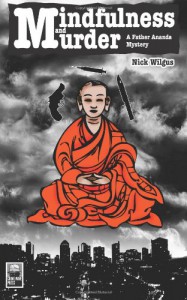Learning Another Culture Through Murder

I started Mindfulness and Murder not sure what I was going to find. I have read crime dramas before and books dealing with all manner of issues concerning Thailand, but never have I encountered one that blended these two together. Considering Mr. Wilgus has spent some time in the Kingdom, I was hoping for something more in tune with the realities of Thai culture, and not the typical Hollywood view of a morally baseless Bangkok as an adult wonderland or a hell on earth entrapping ‘innocent’ westerners. Mr. Wilgus not only stayed away from all the cliches but showed his readers an easily graspable view of Thailand without overwhelming or lecturing them, all the while telling the tale of an excellent murder mystery.
The story revolves around Father Ananda, a senior monk who used to a police officer. Ananda joined the order to escape dealing with personal problems that came from his career as police officer. One morning the body of a young man who is a part of a group of homeless boys that the temple is trying to help is murdered and left in a bathroom in a rather gruesome manner. The Abbot of the temple, knowing Anandas’ past asks him to investigate along with the regular police officers. This starts a larger ball of problems to unravel as Ananda gets closer to the truth, as he finds connections to a drug ring operating in his temple.
Mindfulness and Murder is an American novel, meaning that Mr. Wilgus takes the head on approach to storytelling much the same way many great American authors have, which is, tell the story. He doesn’t get bogged down in details that do not help the story. He shows you the characters through their actions rather than trying to tell you what is going on in their heads. Father Ananda is the only exception to this, as the story is told in first person, but Wilgus keeps Ananda focused avoiding internal ramblings. The keeps the novel moving at a good clip and keeps it interesting.
The stylistic approach goes hand in hand with the Buddhist themes and wisdom weaved throughout the novel. Being mindful of his state of mind keeps Ananda from his internal ramblings, for example. He always pulls away from thinking too much about something that is not a part of the case. Showing the people in action is a more Buddhist approach then telling the reader about them. The characters, from the Abbot, to Brother Kittisaro, the computer nerd monk who administrates the front desk, are filled out by watching what they do and how they speak, rather than explained.
Buddhism goes deep into this novel. The main character bears the name of Buddha’s foremost student, which ties into Anandas‘ character as the novel goes on, he is but a student himself. Wilgus does a great job of working in the fundamental wisdom of Thai Buddhism without being preachy. Anandas’ investigation is a growing processes for him as well as seeking justice for a forgotten and abused young man.
I was also happy with how Mr. Wilgus dealt with the Kingdom of Thailand in his story. Thailand can be very confusing to many westerners and there are still many people who are completely unfamiliar with the country. Wilgus explains aspects of Thai culture clearly without turning the novel into a travelogue or cultural study. He sticks with what the reader needs to know about Thailand through Anandas’ eyes. This introduces Thailand to the reader and keeps them from getting trapped trying to understand many things that might be unfamiliar to them. For readers more familiar with Thailand Father Anandas’ adventures do not seem like a shallow scraping of Thai culture fished out of Lonely Planet guidebook. The depth is still there, but mindful of what needs to be understood for the sake of the story.
I am very pleased to have read this novel and recommend it for anyone wanted a fun, approachable and very human story. I say read it for the tale Mr. Wilgus tells but take away a glimpse of Thailand and it’s Buddhism when you are done.




